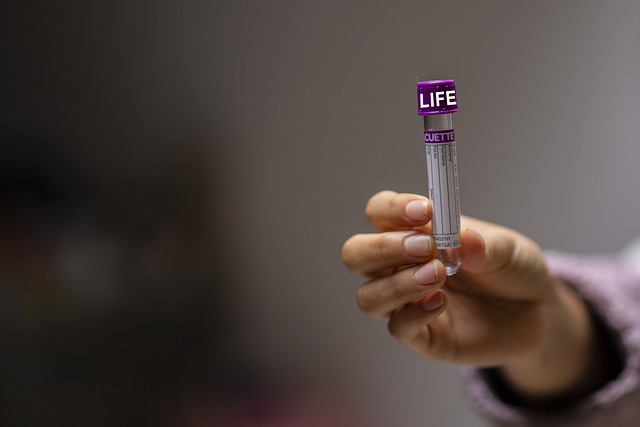Diagnosing reproductive issues in men often hinges on understanding male hormone levels, with the UK Standard Thyroid Blood Test serving as a crucial tool. This test assesses critical hormones like testosterone and thyroid hormones (T3, T4), helping to identify conditions such as hypogonadism or polycystic ovary syndrome (PCOS). Early detection through this test enables timely interventions that enhance fertility and improve reproductive health outcomes, especially when other fertility investigations yield inconclusive results. Accurate interpretation of test results is key to determining the next steps for treatment, which may include medication or anti-thyroid drugs, followed by personalized reproductive health advice.
“Unraveling the complexities of male reproductive health, this article delves into the critical aspect of hormone analysis. Understanding male hormone levels is key to diagnosing various reproductive issues, with the UK Standard Thyroid Blood Test playing a pivotal role. This comprehensive guide explores how these tests provide insights into thyroid function and fertility. By interpreting results from this standard test, healthcare professionals can guide patients toward appropriate treatments or management strategies.”
- Understanding Male Hormone Levels: A Comprehensive Guide
- The Role of Thyroid Blood Tests in Diagnosing Reproductive Issues
- Interpreting Results and Next Steps After a UK Standard Thyroid Blood Test
Understanding Male Hormone Levels: A Comprehensive Guide
Understanding male hormone levels is essential for diagnosing reproductive issues, and a comprehensive guide can help demystify this process. In the UK, a standard thyroid blood test plays a pivotal role in evaluating hormonal health. This test measures various hormones, including testosterone, which is the primary male sex hormone. Levels of testosterone can significantly impact fertility and overall reproductive well-being.
Abnormalities in testosterone levels can be indicative of several conditions. For instance, low testosterone (hypogonadism) may cause reduced sperm production, erectile dysfunction, and decreased libido. Conversely, high testosterone levels could suggest underlying issues like polycystic ovary syndrome (PCOS) or thyroid disorders, such as hyperthyroidism or hypothyroidism, which can be assessed through a UK Standard Thyroid Blood Test. Accurate diagnosis and timely intervention are crucial in managing reproductive health effectively.
The Role of Thyroid Blood Tests in Diagnosing Reproductive Issues
In the diagnosis of reproductive issues, thyroid blood tests play a pivotal role by providing crucial insights into hormonal balance. These tests, such as the UK Standard Thyroid Blood Test, measure key thyroid hormones like T3 and T4, offering a comprehensive view of metabolic health. Abnormalities in these levels can significantly impact fertility and reproductive functions. For instance, hypothyroidism or hyperthyroidism can disrupt ovulation and sperm production, making it essential to include thyroid function assessments as part of the initial diagnostic evaluation.
By evaluating thyroid hormone levels, healthcare professionals can identify underlying conditions that may be contributing to reproductive challenges. This is particularly important in cases where traditional fertility investigations yield inconclusive results. Early detection of thyroid-related issues allows for timely interventions, such as medication adjustments or therapy, which can enhance the chances of successful conception and improve overall reproductive health outcomes.
Interpreting Results and Next Steps After a UK Standard Thyroid Blood Test
After completing a UK Standard Thyroid Blood Test, interpreting the results is a crucial step in understanding the patient’s hormonal balance and identifying potential reproductive issues. This test assesses thyroid-stimulating hormone (TSH), free thyroxine (FT4), and triiodothyronine (T3) levels. Normal ranges vary slightly depending on age and laboratory standards, but generally, TSH should be between 0.4 and 4.0 mU/L, FT4 at 9 to 25 pmol/L, and T3 around 1.0 to 2.0 nmol/L. Deviation from these norms can indicate thyroid dysfunction or hormonal imbalances affecting reproduction.
Upon receiving the test results, healthcare professionals can determine the next steps. If the findings suggest hypothyroidism (low hormone levels), treatment may involve replacing the missing hormones through medication. In cases of hyperthyroidism (high hormone levels), anti-thyroid drugs or other therapies could be prescribed. Regardless of the outcome, further evaluation and personalized advice are essential to managing reproductive health effectively.
Male hormone level analysis, particularly through the UK Standard Thyroid Blood Test, plays a pivotal role in diagnosing reproductive issues. By understanding thyroid blood tests and interpreting results accurately, healthcare professionals can identify underlying hormonal imbalances and guide patients towards appropriate treatment options. This comprehensive approach ensures that men seeking reproductive health support receive accurate diagnoses and effective care tailored to their unique needs.
